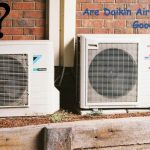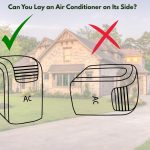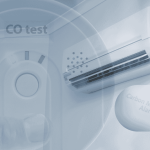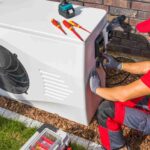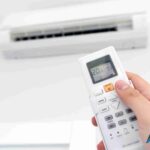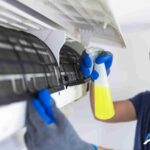In this comprehensive guide, we’ll explore various ways you can accidentally damage your air conditioner.
While we don’t recommend intentionally causing harm to your AC unit, understanding what can go wrong can help you avoid common pitfalls and keep your cooling system in top shape.
We’ll look into 12 things that can damage your air conditioner and the chemicals you should steer clear of. We’ll also discuss the steps you can take to prevent your AC unit from getting destroyed.
12 Things That Can Damage Your Air Conditioner Without Your Knowing
1. Low Refrigerant
- Reasons: Low refrigerant levels can lead to reduced cooling efficiency. This can happen due to leaks or incorrect initial installation.
- How to Fix? Contact a professional to check for leaks and recharge the system with the correct refrigerant. They will need to identify the source of the leak and repair it.
2. Dirty Filter
- Reasons: A clogged air filter restricts airflow and reduces system efficiency. It can lead to increased energy consumption and diminished cooling performance.
- How to Fix? Replace or clean the air filter regularly, usually every one to three months. This simple step can significantly improve system performance and longevity.
3. Dirty Outside Coil
- Reasons: Dirt and debris on the condenser coil can hamper heat transfer, making your AC work harder and less efficiently.
- How to Fix? Clean the coil and ensure the area around the unit is free from obstructions. Regular maintenance can prevent this issue.
4. Dirty Condenser Coils
- Reasons: Dirty condenser coils can hinder heat dissipation and cause your AC to work harder. This can occur due to a lack of maintenance.
- How to Fix? Regularly clean the coils to maintain optimal performance. Routine cleaning is crucial in preventing this problem.
5. Leaking Duct
- Reasons: Leaky ducts can lead to cooled air escaping before it reaches your living spaces, resulting in uneven cooling.
- How to Fix? Seal duct leaks to improve system efficiency. A professional can help locate and seal these leaks, ensuring better airflow.
6. Thermostat Problems
- Reasons: Incorrect thermostat settings can cause the AC to run excessively or inefficiently. It could be due to a malfunctioning thermostat or user error.
- How to Fix? Ensure your thermostat is properly calibrated and functioning. Replacing an old or malfunctioning thermostat can resolve this issue.
7. Clogged Drains
- Reasons: Clogs in the condensate drain can lead to water damage and reduced cooling efficiency. Algae or debris can cause these blockages.
- How to Fix? Regularly check and clean the drain line to prevent blockages. Installing a drain pan treatment can help prevent algae growth.
8. Electrical Control Failure: System Shutdowns
- Reasons: Electrical failures can result in the AC not running or shutting down unexpectedly. This could be due to worn-out components, voltage issues, or a malfunctioning circuit board.
- How to Fix? Consult an HVAC technician to diagnose and repair electrical issues. Replacement of damaged components or electrical repairs may be necessary.
9. Frozen Evaporator Coils
- Reasons: Reduced airflow or low refrigerant levels can cause evaporator coils to freeze. These issues can arise from dirty filters, low refrigerant, or airflow problems.
- How to Fix? Identify and address the root cause, which may involve cleaning coils, changing filters, or adding refrigerant. Preventive maintenance is crucial to avoid this issue.
10. Fan Problems
- Reasons: Issues with the fan can result in inadequate heat exchange and poor cooling. This could be due to a malfunctioning motor, damaged blades, or worn-out bearings.
- How to Fix? Consult a professional to repair or replace malfunctioning fans. This ensures proper airflow and heat exchange, optimizing cooling performance.
11. Faulty Capacitors
- Reasons: Capacitor problems can lead to motor failures and compressor issues. These components may fail due to age, power surges, or overheating.
- How to Fix? Replace faulty capacitors as soon as you notice signs of trouble. Prompt replacement can prevent further damage to the compressor and other components.
12. Refrigerant Leaks
- Reasons: Refrigerant leaks can decrease cooling efficiency and are environmentally harmful. Leaks often occur due to wear and tear or manufacturing defects.
- How to Fix? Locate and repair leaks, then recharge the system with the correct refrigerant. A professional should handle refrigerant-related tasks to ensure safety and proper repairs.
These 4 Chemicals Will Destroy Outdoor Air Conditioning Units
1. Caustic Ammonia Cleaner
- Caustic ammonia-based cleaners can corrode and damage the condenser coils. These cleaners are highly acidic and should never come into contact with your AC unit.
2. Cleaners With Chlorine
- Cleaners containing chlorine can harm the condenser coils and reduce cooling efficiency. The chlorine can corrode the metal components of your AC system.
3. Any Type of Bleach
- Bleach can corrode various AC components and cause severe damage. It’s crucial to avoid using bleach for cleaning your air conditioner.
4. Acid and Alkaline Cleaning Solvents
- Acidic or alkaline cleaning solvents can be harmful to the coils and other parts of your AC unit. These chemicals can lead to rapid deterioration of the metal surfaces.
Using these chemicals on your air conditioner can lead to costly repairs or even the need for a full replacement.
3 Proven Ways to Destroy Your Air Conditioner
Not Scheduling Maintenance
- Neglecting regular maintenance can result in a variety of issues, from dirty coils to refrigerant leaks. Skipping maintenance can lead to a decline in the overall performance of your AC unit.
Not Calling an Expert for Repairs
- Attempting DIY repairs without expertise can lead to further damage. Incorrect repairs can exacerbate existing problems and result in more extensive and expensive repairs.
Not Changing the AC Filter
- Neglecting to change the air filter can reduce system efficiency and lead to various problems. A clogged filter restricts airflow, making the system work harder.
By avoiding these three common mistakes, you can help prevent your air conditioner from getting damaged.
How to Prevent Air Conditioner Damage
To ensure your air conditioner remains in top shape, follow these steps:
Regular Maintenance
- Schedule annual maintenance with a professional to identify and address issues. Regular maintenance helps keep your AC unit in optimal condition.
Timely Repairs
- If you notice any problems, don’t hesitate to call an expert for quick and effective repairs. Prompt repairs can prevent minor issues from becoming major problems.
Regularly Change the AC Filter
- Follow the manufacturer’s recommendations for filter replacement to maintain optimal airflow
How to Keep Your AC Protected? [Summary]
Safeguarding your air conditioner from potential damage involves a proactive approach. By steering clear of harmful chemicals, addressing common issues promptly, and adhering to regular maintenance practices, you can keep your AC unit operating at peak efficiency. Remember, an ounce of prevention is worth a pound of cure when it comes to ensuring the health and longevity of your air conditioning system. Follow these guidelines to enjoy a cool and trouble-free environment for years to come.
